ARTICLE AD BOX

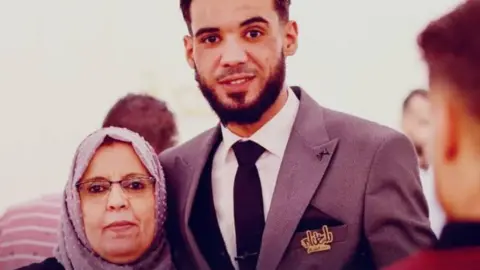 Abdul Aziz Aldali
Abdul Aziz Aldali
One year on, the images of the catastrophic deluge that swept through Libya's coastal city of Derna, killing thousands, linger in the memories of those who survived.
“Life stopped. It’s only the body that is still alive. I’m not the same person,” says Abdul Aziz Aldali, a young resident.
He lost his mother, father and nephews, who had come for a sleepover at their home, when Storm Daniel hit the city on the night of 10 September.
"I consider them martyrs. My neighbours, the Nasser family, lost 24 martyrs. The water reached them first," Mr Aldali says.
Derna is built on the delta of the Wadi Derna river. The stream flows through two dams before crossing the city and emptying into the sea.
The unseasonably heavy rains - along with the failure to do maintenance work on ageing infrastructure - overwhelmed the dams, which eventually ruptured at around 02:00 local time on 11 September.
“A huge wave came through [the house]. Water filled up two floors in less than a second. The water was moving us around the house in the darkness,” Mr Aldali recalls.
“The water was taking me up and down. I swim very well, but it’s hard to control when the water keeps flipping you.”
Eventually, the waves propelled him outside.
“I spotted a network tower. A wave came and pushed me towards it, so I clung to it and tried to resist as much as I could.”
A deluge of water struck the city with an estimated force of 24 million tonnes, sparing no one.
“I looked at the people - small children who couldn’t save themselves. Those who were destined to live survived. Those who weren’t passed away,” Mr Aldali recalls.

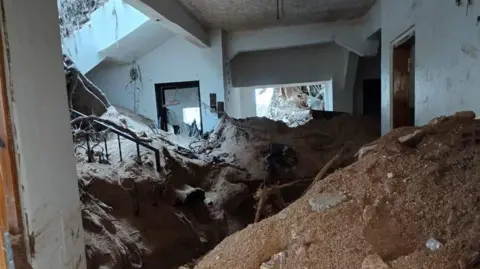 Abdul Aziz Aldali
Abdul Aziz Aldali
The two-storey home of Abdul Aziz Aldali has not been rebuilt
Like many other residents, Mr Aldali has left the city. He has now relocated to Umm al-Rizam, a quaint village which is a 40-minute drive south of Derna.
More than 5,900 people died, according to the UN Office for the Coordination of Humanitarian Affairs (Ocha), and 2,380 more are reported missing in a city with a population of about 90,000.
Locals believe the number of people killed in the flood is much higher.
“Almost all of my friends lost a family member. People in Derna believe more than 10,000 died in the flood,” says Dernawi journalist Johr Ali, who is now based in Turkey's main city, Istanbul, and has been following developments in his home town.
For many Dernawis, the trauma of the loss is compounded by the agonising uncertainty of not knowing the fate of their missing relatives.
“I only found [the bodies] of my nephews,” says Mr Aldali says. “This world is worth nothing without my parents. I only ask Allah to reunite me with them in heaven”.
The General Authority for Search and Identification of Missing Persons (Gasimp) has spent the past 12 months collecting DNA samples from human remains in the hope of finding matches with surviving family members.
“We collected the bodies, took samples from the teeth and other bones, issued reports with the cause of death, and buried the bodies,” Gasimp director Dr Kamal Sewi says.
But finding the remains of the victims has been difficult, with some body parts discovered as far as 60km (37 miles) out to sea or under collapsed buildings.
A special cemetery on the outskirts of Derna has been set up for the victims, but the graves are still nameless because most bodies have not been officially identified, leaving thousands of families without the closure they desperately yearn for.
Numeric codes are kept inside and outside each burial spot. These will eventually be assigned a name if the DNA of the deceased person is matched with that of a living relative.
However, the scale of displacement caused by the deluge has complicated this step of identification.
“It is easier to match DNA samples from direct relatives like parents or siblings,” Dr Sewi says, but finding those close family members has been a challenge.
“People moved from the city because they no longer have a home, but they did not come to report the missing,” Dr Sewi says.
This has further delayed the identification process because the teams have to search for second- or third-generation relatives, which makes DNA matching more complicated.
“[Identification] is not a process that will take one or two months to complete,” Dr Sewi says.
But while the lives of many Dernawis remain in limbo as they await news of their loved ones, the city's reconstruction is well under way.

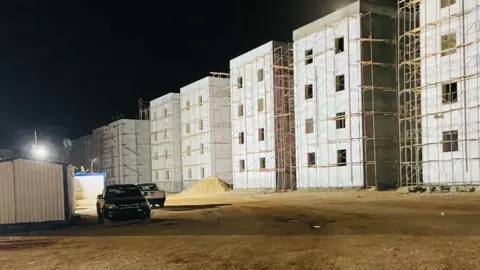 Moataz Fadil
Moataz Fadil
Local officials are proud of the new flats in Derna
Roads have been cleared, schools and mosques are being repaired, and new homes have sprung up.
The so-called Korean buildings, a complex of towering apartment blocks painted in white have become the pride of local authorities, who have also organised press tours to display the finished work.
It has been completed more than a decade after then-ruler Muammar Gaddafi's government commissioned a South Korean company to build the complex.
Construction work was suspended after the outbreak of a civil war in 2011, but resumed after the flood.
Some displaced families have also returned to Derna, attracted by the opportunity to receive compensation of up to 100,000 Libyan dinars ($21,000; £16,000) and subsidised rent.
But financial help to some families - along with the reconstruction effort - has been delayed by bureaucratic bottlenecks, and allegations of financial mismanagement.
A source with the investigative news organisation The Sentry told the BBC that the process appeared to be "opaque", and lacked clear rules.
“Some families who thought they were eligible are still waiting,” he added.
There are also mounting concerns that the victims of the floods have become pawns in the power struggle between Libya's rival governments - headquartered in the capital, Tripoli, and in the eastern city, Bengazi.
Belqasem Haftar - a son of military strongman Gen Khalifa Haftar, who governs the eastern part of Libya - is leading the recovery efforts through the Derna Reconstruction Fund.

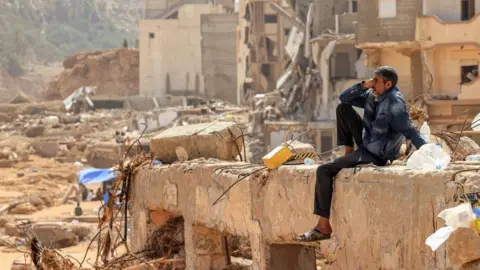 Getty Images
Getty Images
With rival governments in Libya, Derna's reconstruction has become more difficult
With more than $2bn allocated to the fund, it gives the Haftars enormous influence to extend their power base.
"It is a blank cheque with zero oversight,” Libya analyst Anas El Gomati, who heads the Sadeq Institute think-tank, told the AFP news agency.
A spokesman for Gen Hatar's Libyan National Army did not respond to a BBC request for comment.
The source at The Sentry, who preferred to remain anonymous because of the sensitivities around the issue, pointed out that the governor of Libya's central bank had fled the country after a fall-out with the government there.
“Money allocated to the reconstruction of Derna contributed to making the central bank in Tripoli closer to the Haftar family, but the government in Tripoli was bitterly against this,” he added.
As the power struggles and chaos continue to rage, Dernawis like Mr Aldali are warily trying to rebuild their lives.
“We ask the people to pray for those who are behind the maintenance we’re witnessing now and to make the country look better than it was. May Allah have mercy upon them,” he says.
Drone footage from last year shows the level of destruction in Derna in the aftermath of the flood
You may also be interested in:

 Getty Images/BBC
Getty Images/BBC

 4 months ago
19
4 months ago
19
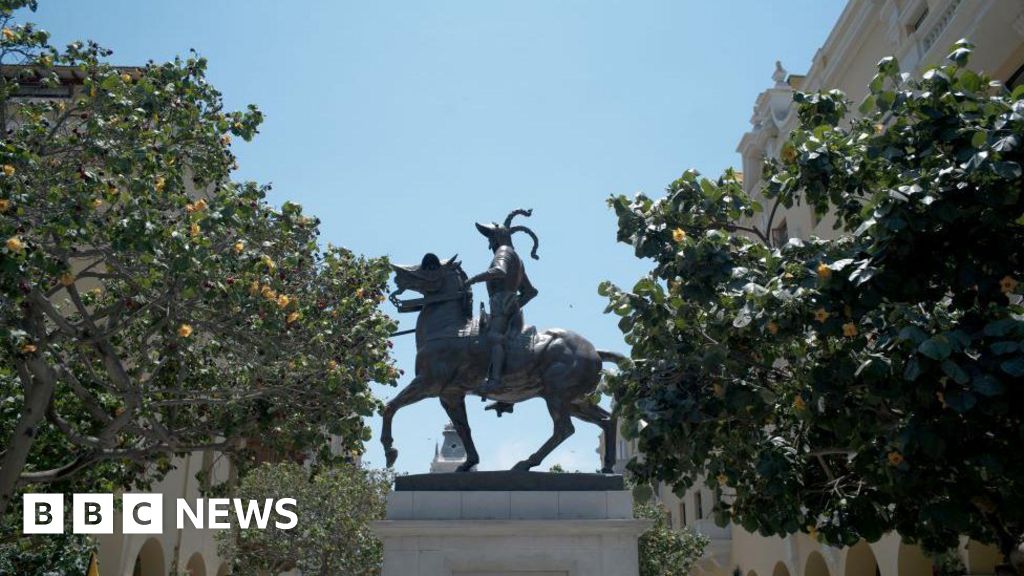
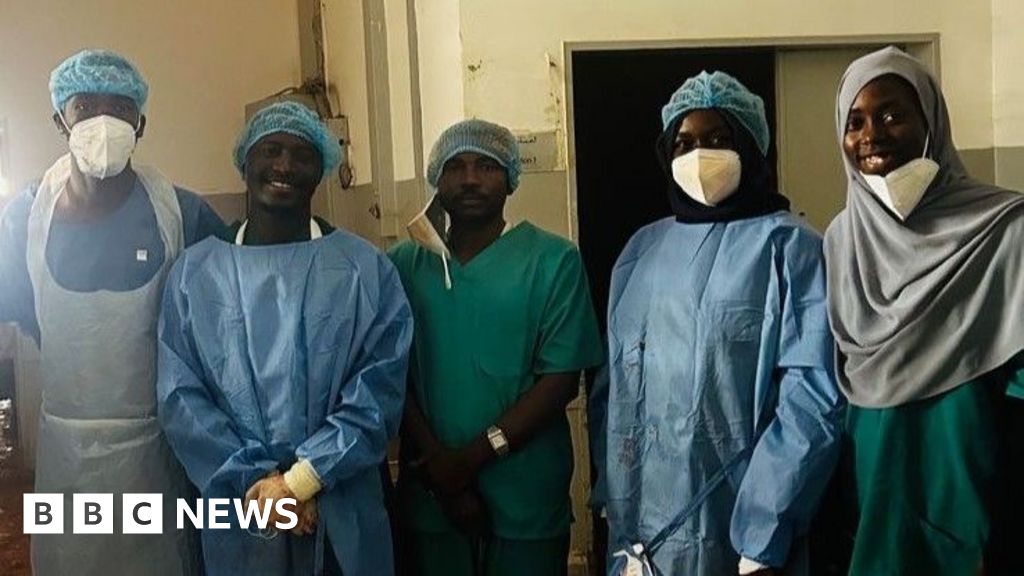
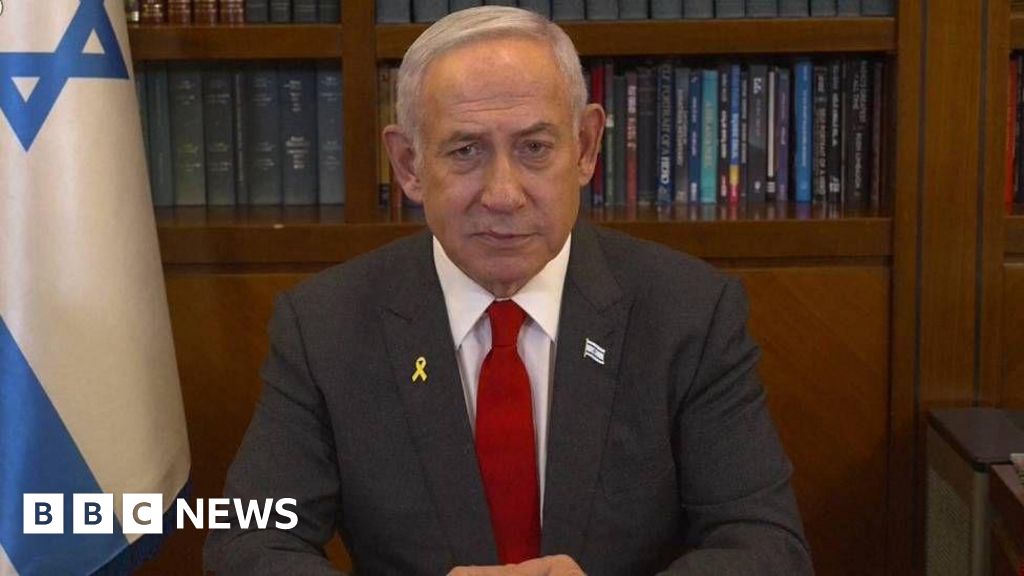





 English (US) ·
English (US) ·